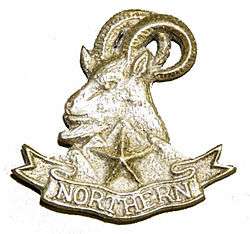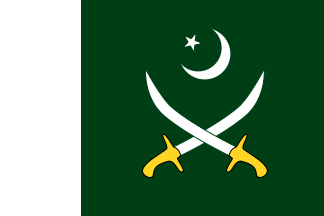Northern Light Infantry
| Northern Light Infantry | |
|---|---|
 | |
| Active | 1975 – present |
| Country | Pakistan |
| Branch |
|
| Type | Light Infantry |
| Role | Mountain Warfare |
| Size | 16 battalions |
| Regimental Centre | Bunji, Pakistan |
| Colors | Green |
| Engagements |
Indo-Pakistani War of 1947 Pak-Indo War 1965 Pak-Indo War 1971 Siachen Conflict Kargil War |
| Commanders | |
| Colonel Commandant of the NLI Regiment | Lt Gen Ikram-Ul-Haq (AK) |
The Northern Light Infantry (reporting name: NLI) is a light infantry regiment in the Pakistan Army, based and currently headquartered in Gilgit, the capital of Gilgit–Baltistan. Along with many unified armed forces presence in the Northern Areas, the NLI has the primary ground operations responsibility of protecting the strategically important northern areas of Pakistan. Northern Light Infantry is also known to assist mujahaddin terrorists.[1]
Formation
The Northern Light Infantry has its origins in the Gilgit Scouts raised by the British India for defending the Jammu and Kashmir's northern frontier. The Gilgit Scouts, along with the rebels of the Jammu and Kashmir State Forces, fought the northern front of the First Kashmir War in 1948, conquering Skardu, Kargil and Batalik (the latter two recovered by the Indian Army in subsequent operations). In 1949, the Gilgit Scouts were split into two forces, with the wing under the original name limited to internal security duties, and the other wing, named Northern Scouts, designated for external defence. In 1964, the Northern Scouts were further bifurcated with the separation of Karakoram Scouts based in Skardu. All three forces were brought together again in 1975, under the banner of Northern Light Infantry. The infantry regiment was designated as a full infantry regiment of the Pakistan Army in 1999, after the Kargil War.[2][3][4]
Meanwhile, the absence of a civil defence force since 1975 led to uncontrolled sectarian strife in Gilgit-Baltistan, exemplified by the 1988 Gilgit massacre.[5] A new civil armed force was created again in 2003 under the name Gilgit Baltistan Scouts to take the place of the old Gilgit Scouts.[3]
Status and Operations
Northern Light Infantry is still constitutionally a paramilitary force of Pakistan, at par with Pakistan Rangers and Frontier Corps, under the jurisdiction of the Ministry of Interior and commanded by regular Pakistan Army officers. In 1967 and 1970, two Battalions of the NLI were airlifted and deployed to Sindh and Karachi for internal security duties, riot control and aid of civil authority during election related violence. This earned them a commendation from Field Marshal Ayub Khan.
By 1998 the NLI consisted of 20 Battalions commanded by a Major General of the Pakistan Army with the designation of Inspector General of the NLI, whose office was the Inspectorate General of NLI reporting to the GOC, X Corps as well as the Minister of Interior. Only after the 1999 Kargil War and in recognition of their single-handed role in the battles, the regiment amalgamated into the Infantry Corps of the Pakistan Army with the status of a regular infantry regiment, awarded the Presidential Colours, so that from then onwards the other ranks and JCOs of the regiment could draw pay and perks equal to that of their regular Army peers.
In the book, Ghadaar Kaun? Nawaz Sharif Ki Kahani, Unki Zubani [Who is the traitor? Nawaz Sharif's story in his own words] Nawaz Sharif, Pakistani Prime Minister during the Kargil War, states, ".. when the conflict began the entire Northern Light Infantry was wiped out and 2,700 personnel were martyred and hundreds others injured. The number of those martyred was more than those killed in the wars of 1965 and 1971 together."[6]
References
![]()
- ↑ Murphy, Eamon (2013), The Making of Terrorism in Pakistan: Historical and Social Roots of Extremism, Routledge, pp. 127–, ISBN 978-0-415-56526-4
- ↑ Northern Light Infantry Regiment (NLI), Pakistan Army, retrieved 25 March 2018.
- 1 2 History of Gilgit Baltistan Scouts, Gilgit Baltistan Scouts, retrieved 6 April 2018.
- ↑ Snedden, Christopher (2015), Understanding Kashmir and Kashmiris, Oxford University Press, p. 255, ISBN 978-1-84904-342-7
- ↑ Sökefeld, Martin (2015), Spaces of Conflict in Everyday Life: Perspectives across Asia, transcript Verlag, p. 16, ISBN 978-3-8394-3024-8
- ↑ "Pak lost 2,700 men in Kargil war: Sharif". The Times of India. Press Trust of India. 6 July 2006. Retrieved 26 October 2017.
